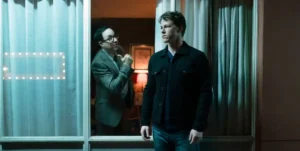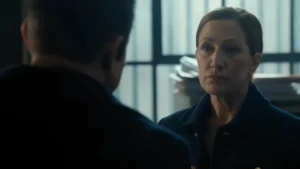Summary
By all means, if you are a fan of the young adult romantic movies, enjoy Chemical Hearts. It is certainly one of the least eye-roll-inducing efforts the genre has produced in recent memory; that just doesn’t mean it is a recommendable one.
Chemical Hearts (Amazon Prime) has an intriguing lead in Austin Abrams (Brad’s Status, Euphoria, Scary Stories To Tell in the Dark) who can be soulful and bring a sensitive intelligence to the smallest roles that always make the ones he chooses interesting enough to care about — which is saying something when it comes to the young-adult romantic film fare. He is really an under the radar talent who smartly goes for a film as a genre that can make or break young stars, even if these films have watered down the market as Westerns did nearly 100 years ago. Chemical Hearts, while not necessarily ending the way you would think, follows mostly the same tropes in countless films of its ilk this past decade.
Abrams plays Henry Page, a high-school student entering his senior year of high school and vying for the spot of the editor of his school newspaper. Though admittedly he hasn’t written anything (huh?), writing is his passion and one would think that would matter to him, his fellow classmates, and even the teacher who handpicked him. The one person who seems to have picked up on that is a new student named Grace Town (Lili Reinhart) who was editor of her old school’s paper and was picked to be co-editor. Henry doesn’t seem to mind that much, we can only assume because even dressed to unimpress and using a cane, Grace is still blonde and leggy, and Henry is a high school boy with raging hormones (sorry, I mean, never had a first love. Yes, that’s it). Soon, they become close, but not enough for Henry’s liking as Grace remains reclusive about her past.
Chemical Hearts was directed by Richard Tanne (Southside by You) along with Krystal Sutherland, who helped adapt the screenplay from her novel Our Chemical Hearts. They try to capture the bittersweet nature of first love, but it is built on a faux premise that has to find some hidden secrets and use of an absurd metaphor to move that theme along. The script really lets Grace’s disability fall to the wayside and is almost used just for added color or texture, like a prop, when it was much more relevant to the story in the source material. The mental health and/or grief she is experiencing is really used as a vehicle to push the romance angle of the story (quite the opposite of the upcoming film, Words on Bathroom Walls). Reinhart is average at best in the role here and has trouble with subtle and nuanced emotional scenes.
Don’t get me wrong, you can argue the genre is not for me, and I have no problem with anyone who enjoys them. The film is relatively enjoyable for what it is, and for Abrams, who keeps you interested. The issue is the film offers the same tropes of the outsider, straight, able-bodied (again, the cane is used as texture), white teenagers, and one with a secret that holds sway over the relationship. The film does some of them well at times, others not, and attempts to add characters with same-sex orientation, minorities, disabilities, though not as any type of main focus but as a backdrop, not anything substantial the way those themes deserve. Even the use of the overused brooding teenage narrator is has become cliché, especially here.
For me, I would check out a film called Lost Husbands that has grounded romance for adults that is available on Netflix right now. By all means, if you are a fan of the young adult romantic movies, enjoy Chemical Hearts. It is certainly one of the least eye-roll-inducing efforts the genre has produced in recent memory but doesn’t mean it is a recommendable one.



